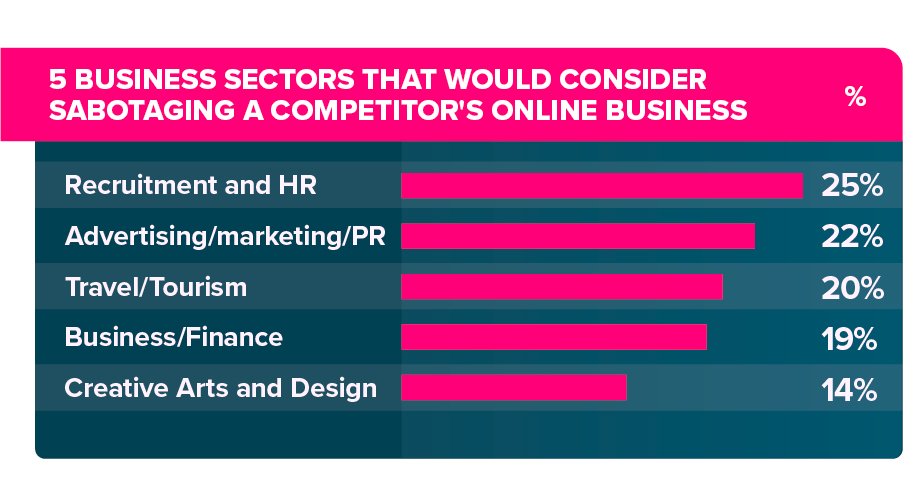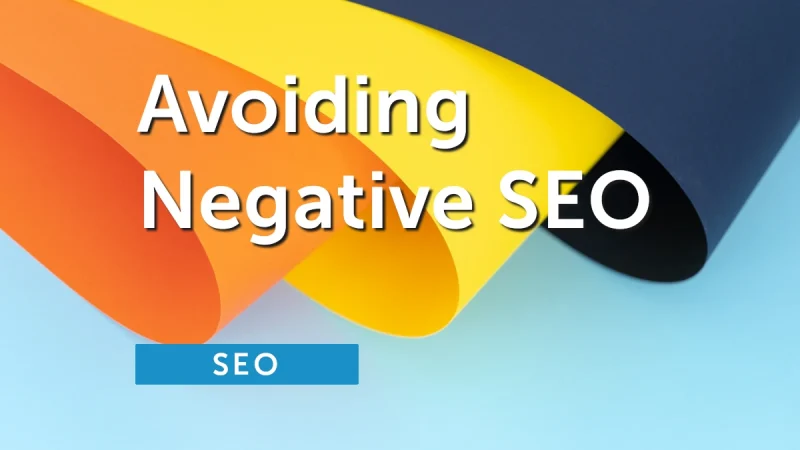Harnessing the Benefits of SEO? Be Vigilent.
SEO is a crucial marketing channel for any successful business venture.
Your online business website will probably not rank as high as it could on search engine results pages without a targeted SEO strategy.
As much as SEO has proven to be an advantage for today’s digital world, its dark side also exists.
👉 Negative SEO is a real issue that can hurt your business, it is not a meme. 💯
Stay vigilent, it could decrease your site’s visibility and hurt your rankings. 😱
What Will I Learn In This Guide? 🤔
- What are negative SEO attacks?
- How does negative SEO work?
- How to identify SEO sabotage.
You’ll also learn why negative SEO can be so damaging to your rankings and how to protect against it.
Let’s get started 😎
What is Negative SEO or SEO Sabotage?
Negative SEO is when a bad actor, as a third party, will negatively impact your website, your search engine rankings or steal search engine rankings for significant keywords.
We could also call this Sabotage SEO.
This kind of SEO sabotage is part of a toolset that a ‘Black Hat’ digital marketer may use to benefit their agenda by suppressing your business website search rankings.
Table of Contents
What Are The Signs Of Negative SEO?
Negative SEO is most likely to happen when someone does not want you to rank well in search engines.
It’s important to recognise these attacks for what they are and take steps to prevent them from hurting you or your clients.
Whether or not you have noticed any signs of SEO sabotage, there are many ways that your site could be affected.
Signs of SEO sabotage include suspicious changes to a website’s content, performance, backlink profile, comments, reviews or mentions. Changes like these could indicate that a competitor wants to harm your rankings.
It may also be a sign that your site is compromised or targeted for a negative SEO campaign.
A Bad Actor Has Compromised Your Website
If you find that your site is being flooded with unwanted content or injected with random links or popups, it could indicate that your website has been hacked. This is a common occurrence, especially for smaller sites.
Hackers are looking to infect sites with malware and steal information from customers, and they can even delete content or redirect your traffic elsewhere.
If you find that your site has been hacked, you will need to take immediate action to ensure that your business does not suffer any losses.
DDoS, the Denial of Service
Another method to disrupt your business is by using an attack called DDoS. A DDoS attack directed at your website can overload the server to bring down your business website or stress your server to decrease the performance of your business website.
So, what is a DDoS attack?
A DDoS attack is a Distributed Denial of Service attack.
A DDoS attack is an attack against a network or a website that causes overloading of the server. The server becomes too slow to handle traffic or becomes inaccessible to users.
Unnatural Backlink Profile Development
Developing an unnatural backlink profile for your business is the most straightforward and most widespread form of Negative SEO.
Backlink profile sabotage can be done by comment spamming, guest posting, content scraping, or just submitting unnatural links to directories.
Commenting on blog posts and social media is a legitimate way to engage your community audience and is when a website owner comments on other websites to promote their business.
Comment spamming is excessively posting comments on blogs, forums and social media, usually purchased in bulk and in an attempt to gain targeted anchor text backlinks. Comment spamming is a black hat method – don’t touch it!
A bad actor will try to add negative value to these traffic building techniques.
Scraping Automation and Link Spamming
Content scraping is the process in which a website is automatically crawled for its content and then re-published elsewhere.
A bad actor can execute content scraping automation through a compromised network of websites or domains set up expressly for this purpose.
A bad actor will try to either steal your rankings, commonly referred to as content hijacking, or diminish your rankings by injecting the newly duplicated content with spammy links, including damaging anchor texts.
Directory spamming, another link spam technique. Submitting an obscene amount of links to website directories that are not relevant to the context of the target, e.g., categorising ‘hair salon’ businesses in ‘pet care’ categories.
Any outdated, spammy or out of context link that appears on any website may be considered unfavourable, ultimately adding to an unnatural backlink profile.
Content Hijacking
Somewhat related to content scraping, Content Hijacking is where a bad actor creates a blog, forum, or any other type of website and then proceeds to copy and paste content from the target.
The end goal is for the bad actor website to rank higher for your original content than you do.
- Bad actors will target your business website’s content for duplication.
- Bad actors will proceed to copy your target site content verbatim to predefined higher Domain Authority website.
- Bad actors will build backlinks to a new site and sabotage the original site or even bring it down, hack, DDoS etc.
- Bad actors site will rank for your content; you will not. You just got Content Hijacked.
Index Sabotage
Targeting your website’s search engine index is another easy way to sabotage your search rankings.
By building links that exploit poor site structure to dilute your website’s search engine index, e.g., linking to UPPERCASE and lowercase URLs that are not canonical to get them indexed as duplicate content.
Index sabotage will stifle your search engine rankings for those pages affected.
Keyword Stealing
Using stolen or hacked backlinks, typically combined with content hijacking and other methods discussed, to boost your competitors link profile and keyword rankings is another way to sabotage your search rankings.
Backlink Profile Removal Requests Spamming
Illegitimate backlink removal requests is a focused approach to link removal.
This method is easily executed and will disrupt your backlink profile by removing valuable links through seemingly legitimate removal requests. I.e., email request for link removal.
Spamming link removal requests on a large scale through email or social media will disrupt your backlink profile and weaken your search engine rankings.
Local Pack Rankings: Do Reviews Matter?
In a recent study of how reviews impact your local SEO, by @TheSocialDude on Semrush, he concluded that reviews are a strong influencer of your local SEO.
The number of reviews for a listing has a stronger impact on its performance, compared to average rating… (and) … in fact have an impact on your Local Pack performance on desktop, especially if your average rating is above 4.1.
The best way to get more reviews for your listing, is to ask your customers for reviews directly.
But, what if your reviews are under a spam attack?
It is a well-known fact that the customer is king. And when customers have a bad experience with your company, they take to social media or review sites to voice their opinions and warn others away from your business.
But what if you are getting negative reviews from customers who never bought from you in the first place? You might be experiencing a spam attack.
Although you may not be able to prevent this from happening you can monitor your site’s reviews closely for anything that looks suspicious.
Google does use automated spam detection to remove reviews that are probably spam.
The possibilities for SEO sabotage are endless. These, and more, techniques are available to anyone.
How to Monitor, Protect and Recover Your Website from SEO Sabotage
In today’s world, filled with cyber-attacks, it is becoming more and more common for websites to come under attack, targeted for data leaks or held for ransom.
SEO strategies are an essential part of any digital marketing strategy. They are a vital foundation for a healthy business.
It can be challenging to stay on top of the latest trends in the world of SEO. Still, it is essential to understand genuine signs of a hostile SEO attack, to put in place monitoring and react accordingly.
Here is our list of services, tools, and methods to monitor, enforce, protect and recover your SEO strategy from negative SEO sabotage attacks.
Monitoring for Negative SEO Sabotage
- Copy protection tools: https://www.copyscape.com/
- Index and crawler: https://github.com/linkchecker/
- Backlink profile monitoring: https://ahrefs.com/
Protection from Negative SEO Sabotage
- Security audits: https://www.qualys.com/solutions/pci-compliance/
- Security certificate audit: https://www.ssllabs.com/ssltest/
- DDoS mitigation: https://www.cloudflare.com/
- DMCA alerts: https://www.dmca.com/
Recovering from Negative SEO Sabotage
Firstly, fix any issues. Confirm fixes in the following areas:
- Security / Hacks
- DDoS / Performance / CDN
- Content / Duplicates / Sitemaps
- Code / Structure / Linking & Broken Links
- Domain & Server Configs / 301 & Other Redirects
Check out the following resources from Google:
- Sitemaps (Google): Build & Submit Sitemaps
- Disavow Links (Google): Webmasters Answer 2648487
- Report Reviews (Google): Business Answer 4596773
- Reconsideration Requests (Google): Requesting Reconsideration
Google’s Take: What You Need to Know
In my opinion Google’s take on negative SEO has traditionally been that it doesn’t happen (very often) and when it does happen you don’t need to worry.
Having said that, Google’s public response to concerns over Negative SEO was the “link disavow” feature released in October 2012.
Since, then Google Webmaster Matt Cutts has said, “In my experience, a lot of people talk about negative SEO, but relatively few people practise it. And there are even fewer who succeed.”
He went on to add that small firms shouldn’t be concerned about being targeted for Negative SEO because the approach is supposedly only utilised in very specialised areas by larger, highly competitive companies.
Matt Cutts on Negative SEO – YouTube Video
Another Google’s representative, Gary Illyes made these statements:
“I looked into probably a couple dozen cases where people were reporting negative SEO—and none of them was actually negative SEO.”
I personally don’t have evidence that would support that negative SEO exists.
Source: Web Hosting Cat Interview
In a Webmasters Hangout, Google’s John Mueller stated, regarding the disavow tool:
“I would say for most websites out there, you probably don’t need to use the disavow tool at all”
And continued to add
You’re welcome to use the disavow tool and that has no negative effect.
John Mueller on Negative SEO and the Disavow Tool- YouTube Video
Ok, so, Google’s take on negative SEO is that it’s rare and when it does happen, they’ve got it under control anyway.
As for me, reading statements that include ‘in general’, ‘for the most part’, ‘suspect that works fairly well’ and ‘very few people with actual issues around that’ means that this is a genuine problem, although infrequent, a legitimate issue none the less.
I’m going to go way out on a limb and say my response to this issue is, if you identify a genuine attack, use the link disavow tool and issue link removal requests.
However, be aware that Google sources repeatedly say that these backlinks may be helping your rankings.
To disavow may hinder your rankings, effectively shooting yourself in the foot!
Also, it’s important to remember; the Webmaster Central Blog encourages you to have faith in their abilities to reward good sites and punish bad ones.
Most of the websites across the world do not need to worry about SEO Sabotage.
More on Online Business Sabotage
Search engine dominance has created endless opportunities for businesses to grow and expand, however it can be a playground for malicious intent. Here are some extra resource link to consider when researching business vulnerability.
- Reboot Study
- Help! I’ve Been Sabotaged!
- Articles by George Davis.
Alternatively, if you’re looking for help, you can hire a digital marketing agency like us, Orebix Digital. We will help you overturn the efforts of negative SEO from your website.
As a leading SEO and internet marketing agency in Stockport, we can identify problems with your website, whatever the source and correct them, to improve your ranking and boost your traffic.
Negative SEO: The Final Word
We have discussed some of the numerous ways for an external body to impact your organic performance negatively.
We have also talked about the most fundamental actions to ensure that you are protected and that SEO sabotage concerns are detected quickly.
We have also pointed out Google’s position on its ability to deal with these issues without needing to worry at all.
At any rate, whatever you took away from our SEO sabotage article, remember that if you want to see your site rank and maintain rankings, you have to make sure that you’re protected.
Understanding the points raised in this article, you’ll have greater peace of mind by running a stable, robust and resilient website. Most people will not need to worry. The handful of us leftover; we know what we need to do.

Source: Reboot Online
Find out more about your website SEO.
Book your FREE consultation today!

90% of website content gets no traffic from Google. 70% of small businesses do not employ an SEO strategy.
Learn how we can help improve your business online presence through SEO, content and social media.
We help create your digital footprint.

